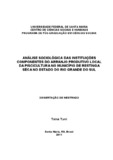| dc.creator | Turri, Tainá | |
| dc.date.accessioned | 2012-06-06 | |
| dc.date.available | 2012-06-06 | |
| dc.date.issued | 2011-03-24 | |
| dc.identifier.citation | TURRI, Tainá. PISCICULTURE CLUSTER AT JACUÍ-CENTRO
AN ANALYZIS OF THE PARTNERS INSTITUTIONAL BEHAVIOR.. 2011. 102 f. Dissertação (Mestrado em Sociologia) - Universidade Federal de Santa Maria, Santa Maria, 2011. | por |
| dc.identifier.uri | http://repositorio.ufsm.br/handle/1/6218 | |
| dc.description.abstract | This dissertation analyzes the role of institutional environment and its influence over
the institutions that participate of the Pisciculture cluster at the region COREDE Jacuí-
Centro, at Rio Grande do Sul, particularly the actions that took place in the city of Restinga
Sêca. For that, based in the so called New Economic Sociology (Mark Granovetter) and in
the Structural Theory (Anthony Giddens), it s made an attempt to understand sociologically
the Pisciculture Cluster and its effectivation in Restinga Sêca, under the perspective of the
proximity economies development. It explores the definition of the Productive Local
Arrangement as a public policy, from your logic of social political constitution, without
reducing it to a strictly economic event. The Cluster is formed by an agglomerate of
institutions that organize a project to be executed concerned to a determined productive
activity, that promotes a possibility for local interaction and a generation of benefits to the
ones involved, which may lead to an income s increase and the possibility of life quality
improvement to the communities involved. In the present work, the Cluster was described
and analyzed from the understanding (reasons, interests and projects) from each formal
organization involved in the Cluster. From this approach, the importance of the institutional
environment can be assessed and the organization of the Cluster in question throughout this
study. These analysis results pointed to a Cluster with large difficulties to be executed, a low
level of articulation between the interested parts and the results. As regarding the life quality
and income increase, insufficient. | eng |
| dc.format | application/pdf | por |
| dc.language | por | por |
| dc.publisher | Universidade Federal de Santa Maria | por |
| dc.rights | Acesso Aberto | por |
| dc.subject | Arranjo produtivo local | por |
| dc.subject | Nova sociologia econômica | por |
| dc.subject | Piscicultura | por |
| dc.subject | Cluster | eng |
| dc.subject | New economic sociology | eng |
| dc.subject | Pisciculture | eng |
| dc.title | Análise sociológica das instituições componentes do arranjo produtivo local da piscicultura no município de Restinga Sêca no estado do Rio Grande do Sul | por |
| dc.title.alternative | Pisciculture cluster at Jacuí-Centro
an analyzis of the partners institutional behavior | eng |
| dc.type | Dissertação | por |
| dc.description.resumo | Esta dissertação analisa o papel do ambiente institucional e o papel desempenhado
pelas instituições componentes do Arranjo Produtivo Local na região do COREDE Jacuí-
Centro, no Rio Grande do Sul, mais particularmente das ações ocorridas no município de
Restinga Sêca. Para tanto, baseada na chamada Nova Sociologia Econômica (Mark
Granovetter) e na Teoria da Estruturação (Anthony Giddens) tenta-se compreender
sociologicamente o APL da Piscicultura, de sua efetivação em Restinga Sêca dentro da
perspectiva do desenvolvimento das economias de proximidade. Explora-se a definição do
APL enquanto política pública, de sua lógica de constituição sócio-política, sem reduzi-la à
condição de evento econômico estritamente. O APL é formado por um aglomerado de
instituições que organizam um projeto para ser executado em torno de uma determinada
atividade produtiva, onde existe uma possibilidade de interação local e geração de
benefícios para os envolvidos, podendo gerar um aumento de renda e a possível melhora na
qualidade de vida das comunidades envolvidas. No presente texto, o Arranjo Produtivo Local
foi descrito e analisado a partir do entendimento (razões, interesses e projetos) de cada
organização formal envolvidas no Arranjo Produtivo Local. A partir dessa abordagem, podese
avaliar a importância do ambiente institucional e organizacional no Arranjo Produtivo
Local em questão no estudo. Os resultados da análise apontaram um Arranjo Produtivo
Local com grandes dificuldades para ser executado, baixo nível de articulação entre as
partes interessadas e resultados, no tocante à qualidade de vida e aumento de renda, pífios. | por |
| dc.contributor.advisor1 | Lima, Joao Vicente Ribeiro Barroso da Costa | |
| dc.contributor.advisor1Lattes | http://lattes.cnpq.br/5278455249783896 | por |
| dc.contributor.referee1 | Neves, Fabrício Monteiro | |
| dc.contributor.referee1Lattes | http://lattes.cnpq.br/5812207127672055 | por |
| dc.contributor.referee2 | Almeida, Francis Moraes de | |
| dc.contributor.referee2Lattes | http://lattes.cnpq.br/8180956076012731 | por |
| dc.creator.Lattes | http://lattes.cnpq.br/0935601360986101 | por |
| dc.publisher.country | BR | por |
| dc.publisher.department | Sociologia | por |
| dc.publisher.initials | UFSM | por |
| dc.publisher.program | Programa de Pós-Graduação em Ciências Sociais | por |
| dc.subject.cnpq | CNPQ::CIENCIAS HUMANAS::SOCIOLOGIA | por |


